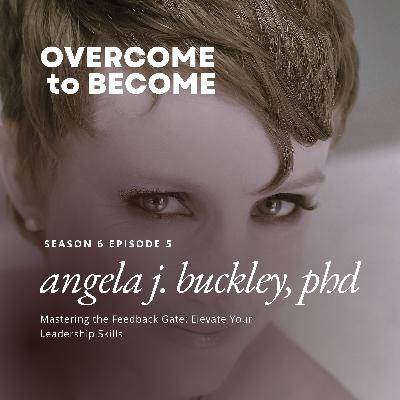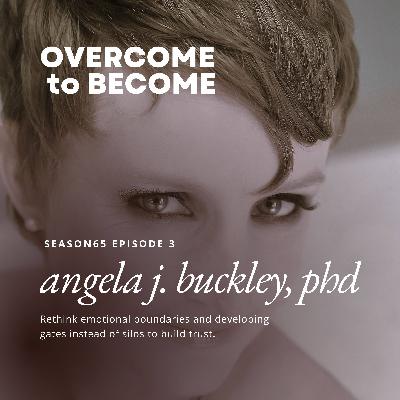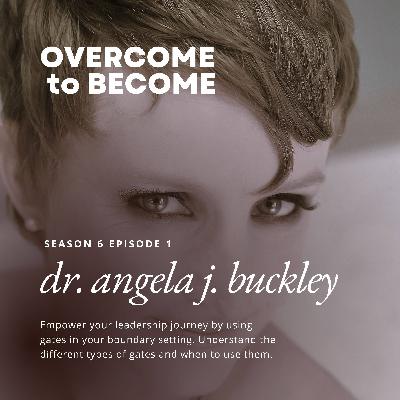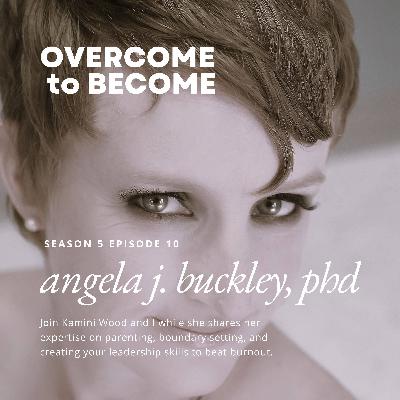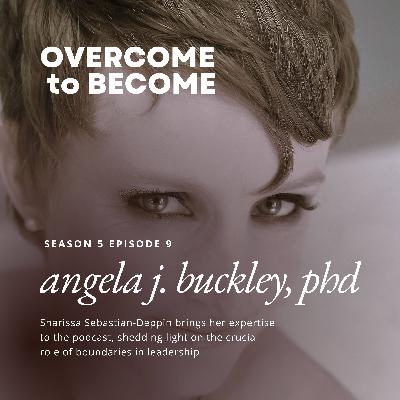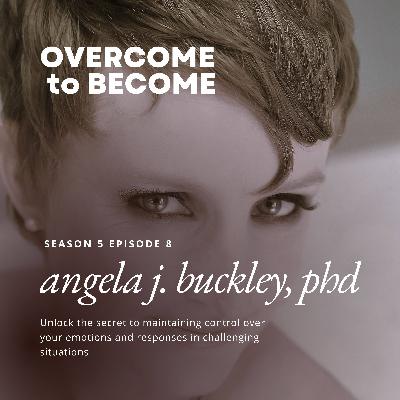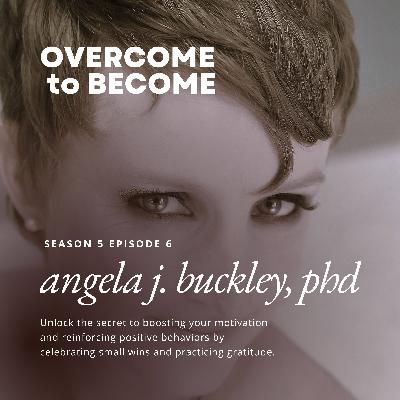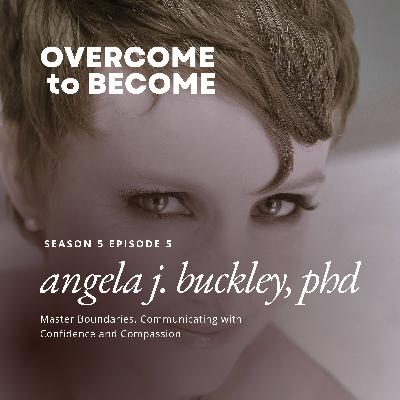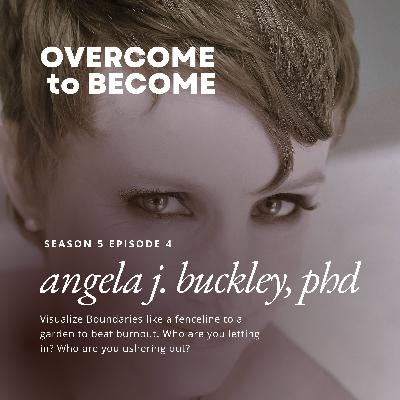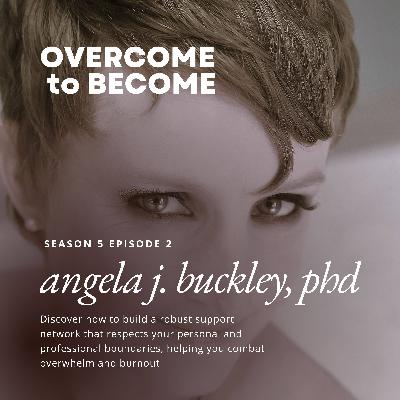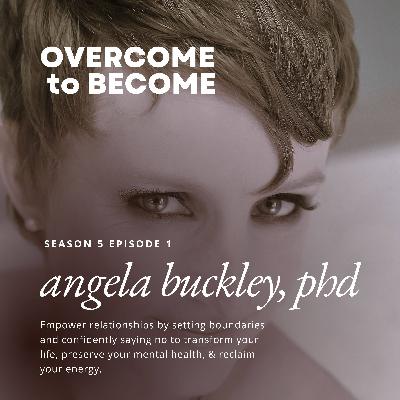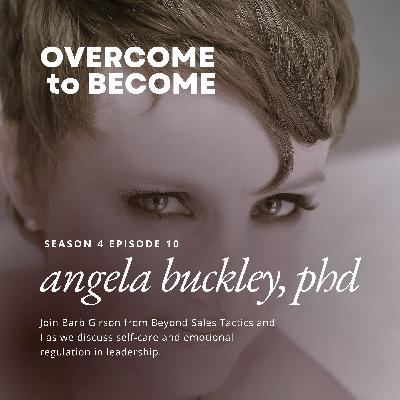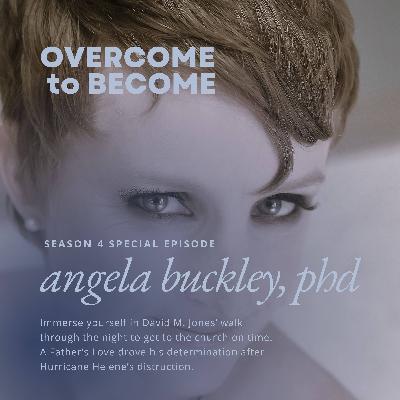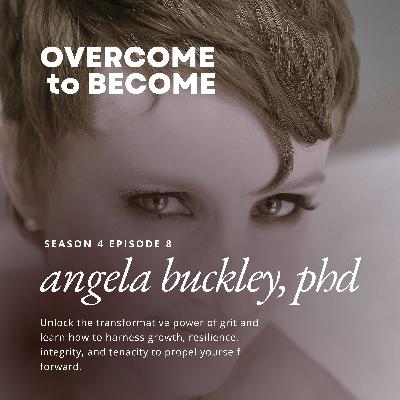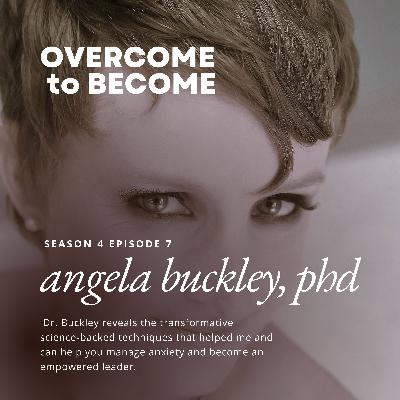Discover Overcome to Become
Overcome to Become

Overcome to Become
Author: Dr. Angela J. Buckley
Subscribed: 1Played: 12Subscribe
Share
Description
Whether you’re a busy professional, overwhelmed parent, or do-it-yourselfer, you’re sure to pick up actionable tidbits to overcome the overwhelm when you listen to Overcome to Become.
The first step in becoming a leader is to learn to lead yourself: You like yourself, you trust yourself, and you set boundaries for yourself. Once you have mastered the disciplines associated with like, trust, and boundaries, you are ready to start leading others.
My name is Angela Buckley, your host and author of the Strength in Nature Leadership series. I am a mother, triathlete, author, leadership consultant, and doctoral candidate in Organizational Leadership. I have spent a career doing too many things at once. I’m here to speak with experts and share with you the many lessons I have learned along my personal leadership journey to keep overwhelm and burnout at bay. Thanks for being here.
56 Episodes
Reverse
Podcast Summary Unlock the secrets of the "feedback gate" and elevate your leadership skills with Dr. Angela J. Buckley. This episode promises to equip you with a robust mental framework to filter, evaluate, and prioritize feedback, ensuring that only the most valuable insights guide your growth. By understanding the nuances of feedback, such as its source, context, and intention, you’ll learn to discern which feedback should prompt action and which can be graciously set aside. Through a vivid example from a work presentation, Dr. Buckley illustrates how to apply these principles effectively, helping you recognize patterns and ensure feedback is both actionable and constructive. Reflect on the power of feedback in leadership as we explore the importance of developing a decision-making gate that encourages continuous personal and professional development. Dr. Buckley emphasizes the need for self-leadership, urging listeners to focus on values-based leadership that underscores character, community, and capability. With practical insights and key takeaways, this episode is a compelling guide for those committed to actively pursuing self-improvement. For those craving further insights on gratitude and leadership, subscribing to Dr. Buckley’s newsletter is a must. Keywords Feedback Gate, Leadership, Decision-making, Personal Development, Professional Development, Self-leadership, Values-based Leadership, Character, Community, Capability, Gratitude, Newsletter, Source, Context, Intention, Specificity, Frequency, Emotional Response, Acknowledge, Respectfully, Worth, Work Presentation, Patterns, Specific, Actionable, Constructive, Reflecting, Discerning, Framework, Evaluating, Pursuing Improvement, Dr. Angela J. Buckley Highlights (02:44) Key Elements of Effective Feedback (112 Seconds) (08:37) Effective Feedback Analysis Using AI (86 Seconds) Keywords Feedback Gate, Leadership, Decision-making, Personal Development, Professional Development, Self-leadership, Values-based Leadership, Character, Community, Capability, Gratitude, Newsletter, Source, Context, Intention, Specificity, Frequency, Emotional Response, Acknowledge, Respectfully, Worth, Work Presentation, Patterns, Specific, Actionable, Constructive, Reflecting, Discerning, Framework, Evaluating, Pursuing Improvement, Dr. Angela J. Buckley
Podcast Summary Unlock the secret to making deliberate, values-driven decisions with the "opportunity gate" framework. Join me, Dr. Angela J. Buckley, as I reveal a powerful tool that distinguishes the flood of options you encounter every day. This episode will equip you with the questions and insights necessary to ensure your choices align with your true mission and vision, reducing the risk of burnout and overcommitment. Navigate life and leadership with clarity and intention, focusing on quality rather than quantity. Discover how the opportunity gate can transform your approach to leadership and personal growth. I'll share practical examples, like evaluating a speaking engagement, to showcase how this framework keeps you aligned with your goals and values. By adopting this tool, you'll learn to embrace the power of saying no, while remaining open to calculated risks and intuitive decisions. Tune in and learn how to apply these strategies to become a more intentional and effective leader, fostering success in both your personal and professional life. Keywords Decision-making, Values-driven, Opportunity Gate, Flood of Options, Mission, Vision, Burnout, Overcommitment, Life, Leadership, Clarity, Intention, Quality, Personal Growth, Speaking Engagement, Goals, Values, Saying No, Calculated Risks, Intuitive Decisions, Effective Leader, Success, Professional Life Highlights (00:41) Navigating Opportunity Gates (84 Seconds) (04:20) Implementing Mission, Vision, and Values (67 Seconds)
Podcast Summary Unlock the secrets of emotional mastery and enhance your leadership skills as Dr. Angela Buckley guides you through the transformative power of managing your emotional gate. Discover how to maintain emotional balance by regulating when to open and close your inner gates, allowing for healthier engagement with the world around you. Through her insightful narrative, Angela explores the critical elements of awareness, regulation, and expression of emotions, offering practical strategies such as mindfulness and the pause technique. You'll hear a touching story about her son's powerful use of music as a non-verbal form of emotional expression, illustrating that even the youngest individuals can communicate feelings in profound ways. Explore the art of setting healthy emotional boundaries, an essential skill for building meaningful connections while safeguarding your own emotional well-being. Angela breaks down the misconception that boundaries are barriers, presenting them instead as gates that can be expertly managed to support personal and relational growth. As part of the "Overcome to Become" series, she encourages you to refine these skills further, enhancing your effectiveness in leading both yourself and others. Don't miss out on upcoming episodes brimming with additional insights on boundary setting, and be sure to subscribe to Angela's newsletter for more on gratitude and leadership development. Highlights (01:13) Managing Your Emotional Gate (121 Seconds) (09:08) Cultivating Empathy for Emotional Interaction (82 Seconds) Keywords Emotional Mastery, Leadership Skills, Emotional Gate, Emotional Balance, Awareness, Regulation, Expression, Mindfulness, Pause Technique, Emotional Boundaries, Meaningful Connections, Personal Growth, Overcome to Become, Gratitude, Leadership Development, Non-Verbal Expression, Music, Boundaries as Gates, Safeguarding, Effective Communication
Ever felt buried under the endless stream of information that demands your attention every day? Imagine transforming that chaos into a powerful leadership tool. In this episode of Overcome to Become, join me, Dr. Angela Buckley, as I unveil the concept of the "knowledge gate," a transformative strategy to navigate and thrive in today’s information-saturated world. I share my personal journey from feeling overwhelmed by a deluge of emails and newsletters to adopting a more deliberate approach that distinguishes between valuable insights and mere noise. By embracing timeless leadership principles and focusing on critical thought leaders like Adam Grant and Brene Brown, you too can refine your leadership approach and harness the power of selective knowledge integration. Discover practical steps to curating reliable information sources, honing your critical thinking skills, and creating a system for effective knowledge retention and application. Let's move beyond passive consumption and towards actively engaging with the information that truly matters. Whether you're just stepping into leadership or are a seasoned executive, these actionable insights will help you build a robust knowledge gate, turning information overload into a wellspring of clarity and confidence. Tune in and begin your journey from overwhelmed to insightful leadership.
Want to learn more? Swing over to the blog and signup for our newsletter at www.strengthinnature.com
Podcast Summary Have you ever considered that the gates in your life—those barriers that filter what you let in and keep out—could be the key to your leadership success? As we open the sixth season of Overcome to Become, we explore this fascinating metaphor of gates, diving into the ways they can transform how we manage information, emotions, opportunities, and challenges on our leadership journey. Imagine creating a balanced system where gates act as tools for growth, allowing the right things in while keeping distractions and negativity at bay. This season, I'm excited to guide you through constructing and maintaining your own metaphorical gates, with insights drawn from leaders who have mastered this art. In our latest episode, we reflect on our journey through five impactful seasons of self-leadership exploration, from overcoming imposter syndrome to setting boundaries. Now, we're ready to tackle the concept of gates, starting with how to manage the constant flood of information in our digital age. Picture this: the knowledge gate filters information, the emotional gate regulates your responses, and the opportunity gate helps you discern which paths to pursue. We’ll journey through these concepts together, ensuring each gate serves its purpose in fostering an environment ripe for innovation and personal growth. As we embark on this new theme, consider the gates in your own life—are they serving you, or is it time to adjust their openness? Join us as we collectively step toward becoming the leaders we are destined to be. Keywords Self-leadership, Gates, Gatekeeping, Metaphor, Transformative, Managing, Information, Emotions, Opportunities, Personal, Professional, Dr. Angela Buckley, Knowledge Gate, Emotional Gate, Leadership, Innovation, Growth, Meaningful Interaction, Digital Deluge, Development, Leader
(00:01) Empowering Self-Compassion and Boundaries
This chapter focuses on the importance of boundary setting and self-compassion in overcoming burnout and achieving personal growth. I welcome Kamini Wood, an accomplished entrepreneur and life coach, to share her insights and experiences. Kamini discusses her journey from being a people pleaser and overachiever to a human potential coach, emphasizing the significance of understanding oneself to tackle issues like stress and anxiety. We explore techniques for successful boundary setting, the inevitable backlash that can arise, and the necessity of flexibility in managing boundaries. Kamini shares stories from her personal and professional life, including her experience as a mother of five, highlighting the evolution of parenting styles and the importance of mindful parenting. Through these discussions, we aim to empower listeners to navigate their challenges and rediscover their authentic selves.
(09:10) Navigating Boundaries and Relationships
This chapter focuses on the significance of setting boundaries to maintain healthy relationships. We explore the emotional cues like feeling stuck, overwhelmed, or anxious as indicators that boundaries may be lacking. I discuss the common misconception that boundaries push people away and instead highlight their role in fostering healthier relationships. It's crucial to understand personal needs and values before initiating boundary-setting conversations. We address the challenges faced, especially for those who haven't seen boundaries modeled in their upbringing, and offer strategies for navigating pushback and discomfort when communicating these boundaries. Additionally, we touch on practical approaches, such as defining personal roles and expectations, illustrated through the example of managing relationships with in-laws. Throughout, the emphasis is on self-awareness, resilience, and redefining narratives around personal roles in relationships.
(21:31) Navigating Support Systems and Boundaries
This chapter explores the importance of building a support network when setting personal boundaries to combat burnout, focusing on how isolation, one of the key components of burnout, can be mitigated through open communication. I discuss strategies for involving loved ones, such as partners, in boundary-setting processes by sharing personal experiences and feelings without placing blame. By clearly communicating our needs and the boundaries we're aiming to establish, we can create a strong support system that offers encouragement and accountability. This approach helps prevent misunderstandings and ensures that those close to us understand and support our journey. I also emphasize the need for honest conversations to gauge whether our support network can meet our needs, allowing us to seek additional support if necessary.
(26:59) Practicing Curiosity and Self-Compassion
This chapter explores the nuances of seeking advice and support, particularly for new entrepreneurs and individuals setting boundaries. We discuss the importance of distinguishing between asking for advice and seeking permission from friends, emphasizing the need for self-awareness and clarity in one's needs. When encountering pushback from a support system, it opens opportunities for healthy dialogue and understanding differing perspectives. We encourage embracing curiosity over judgment by practicing self-compassion and kindness, reflecting on experiences with a mindset of learning rather than self-criticism. We also highlight the power of asking open-ended, non-judgmental questions to foster meaningful conversations and personal growth. Through personal anecdotes, we illustrate how curiosity can be nurtured in relationships, encouraging a supportive environment where open dialogue thrives.
(33:17) Navigating Compassion and Boundaries
This chapter focuses on the journey of balancing compassion for oneself with compassion for others, particularly from the perspective of a people pleaser. We explore the misconception that self-compassion is selfish and discuss how caring for oneself is essential to effectively support others. The conversation highlights the importance of boundary setting, distinguishing between having compassion for others and feeling responsible for their emotions. We also examine the discomfort that arises when boundaries are set and emphasize the significance of allowing others to manage their reactions. The discussion touches on the concept of "grace and space," sharing insights on when it is appropriate to offer forgiveness and space to others, and when it is necessary to prioritize one's own well-being by moving on from unhealthy relationships. Additionally, we consider how individuals can use this space to self-reflect and potentially reconcile, leading to healthier interactions.
Keywords:
Transformation, Boundary Setting, Self-Compassion, Stress, Anxiety, Burnout, Personal Growth, Relationships, Emotional Indicators, Flexibility, Support Network, Mindful Parenting, Parenting Styles, Authenticity, Challenges, Narratives, Self-Awareness, Resilience, In-Laws, Isolation, Open Communication, Strategies, Involving Loved Ones, Seeking Advice, Permission, Curiosity, Judgment, Kindness, Personal Anecdotes, Balancing Compassion, People Pleaser, Forgiveness, Space, Self-Reflection, Unhealthy Relationships
References:
KaminiWood.com
@AuthenticMe
Summary
(00:01) Empowering Introverted Leaders Through Boundaries
This chapter of the Overcome to Become podcast introduces Sharissa Sebastian-Deppen, CEO of Leadership Mastery Alliance, who specializes in empowering introverted women in corporate leadership. Together, we explore how to establish and maintain boundaries to combat burnout and enhance focus. Sharissa shares her journey from software engineering to technology leadership and eventually to coaching, motivated by her own experience with burnout and a desire for change. She highlights the pivotal role of faith and serendipitous encounters that guided her toward a career in coaching. As a Myers-Briggs certified practitioner with over 15 years of corporate leadership experience, Sharissa emphasizes the importance of leveraging personal strengths and setting boundaries to maintain a healthy mindset and thrive in leadership roles.
(09:23) Setting Healthy Boundaries for Self-Care
This chapter focuses on the importance of understanding and establishing healthy boundaries, especially for those who grew up perceiving boundaries as negative or unhelpful. We explore how redefining boundaries as beneficial for both oneself and others can transform relationships and personal well-being. By aligning decisions with personal values and approaching conversations with mindfulness, it's possible to maintain relationships while respecting personal limits. The discussion highlights the significance of proactive decision-making and the necessity of taking care of oneself to avoid stress and resentment. By doing so, individuals can show up as their best selves, ready to serve and support others effectively.
(22:00) Personal and Professional Boundaries
This chapter explores the parallels between coaching in a corporate setting and effective parenting, focusing on setting boundaries and achieving alignment in communication. We discuss the importance of understanding the end goal in both professional and personal environments, and how aligning on expectations can ease difficult conversations. Emphasizing the emotional burden that often arises more intensely at home, we highlight how mastering emotional regulation and boundary-setting in personal life can translate to more effective interactions in the workplace. By addressing these challenges at home, where emotional triggers and lack of sleep are common, we suggest that individuals can enhance their professional demeanor. Additionally, the conversation touches on the dynamics of being an ambivert, balancing the need for extroversion at work with the necessity for introversion at home, and the significance of role modeling effective communication and emotional awareness for loved ones.
(28:24) Maintaining Consistent Communication of Boundaries
This chapter focuses on the importance of setting and maintaining boundaries in both professional and personal settings. We explore how effective communication and consistency are key in upholding these boundaries, preventing confusion and frustration for both ourselves and others. By establishing clear priorities, we can better filter requests and ensure our time is spent on what truly matters. The conversation draws parallels between work scenarios and parenting, highlighting the necessity of teaching others how to treat us through consistent boundary enforcement. We also discuss the emotional toll of not holding firm on boundaries, noting how it can lead to stress and frustration when decisions are made out of pressure rather than genuine willingness. Lastly, we acknowledge that boundaries may need to adapt over time depending on life circumstances, emphasizing the importance of regularly reassessing their relevance and effectiveness.
(34:00) Navigating Boundary Setting and People Pleasing
This chapter addresses how to effectively communicate boundaries when faced with an overwhelming workload. I explore strategies to maintain balance, such as informing others that while a task may be familiar, current priorities prevent its immediate completion. Emphasizing the importance of not committing to future dates without a clear view of upcoming obligations, I suggest revisiting the task at a later time to allow both parties to reassess priorities. Language plays a critical role in boundary-setting, especially for introverted leaders who may feel pressured to make instant decisions. I encourage allowing time for internal processing and advise seeking permission to respond at a later time, thus avoiding hasty commitments and reducing stress. The discussion transitions into the topic of people-pleasing, hinting at future exploration of transforming this mindset.
(40:24) Navigating the Coaching Process
This chapter focuses on the importance of directing energy towards what we can control and the significance of setting healthy boundaries in relationships. I discuss how chasing after people and trying to please everyone can drain energy and lead to stress, emphasizing that people may be in our lives for only a season. By maintaining our boundaries and focusing on being the best version of ourselves, we can foster healthier relationships. Additionally, I explore the role of influence versus convincing in interactions and highlight that others are responsible for their reactions and engagement with us. The chapter also touches on the essential qualities I look for in coaching clients, such as openness and willingness to explore personal beliefs and challenges. Emphasizing the importance of commitment and engagement, I note that coaching may not be suitable for everyone, but for those open to the process, it can be an exciting journey of self-discovery and growth.
(49:02) Building Bridges Across Generations
This chapter focuses on the generational gap and its impact on personal and professional relationships. We explore how the increased age gap between parents and children creates unique challenges and opportunities for growth and understanding. Emphasizing the importance of curiosity and empathy, we discuss how these qualities can bridge generational differences, especially in the workplace. It's crucial to approach interactions without assumptions, as this fosters genuine connections and reduces misunderstandings. Additionally, we highlight the significance of setting boundaries, framing them as loving and kind acts that enable individuals to serve others more effectively by maintaining personal well-being. For further insights and guidance, listeners are encouraged to reach out to our guest, Sharissa, at her contact provided in the show notes.
Contact Information:
Introverted Servant Leader
Sharissa Sebastian-Deppen
Unlock the secret to maintaining control over your emotions and responses in challenging situations with Dr. Angela Buckley on this enlightening episode of Overcome to Become. If you've ever struggled with setting boundaries that others fail to respect, prepare to gain a new perspective and actionable strategies. Dr. Buckley shares her wisdom on recognizing and naming emotions, using tools like deep breathing and mindfulness to respond thoughtfully instead of reacting impulsively. You'll learn how to normalize feelings of frustration and disappointment, ensuring they don't dictate your behavior when boundaries are overstepped.
Through engaging anecdotes and insightful reflections, Dr. Buckley guides listeners on approaching boundary challenges with curiosity and compassion. She emphasizes the importance of pressing pause to reassess desired outcomes and navigate tough conversations. This episode is an empowering resource for anyone looking to enhance their leadership skills and personal empowerment. It's not just about setting boundaries—it's about reinforcing them effectively and compassionately, leading to healthier communication and stronger relationships in both personal and professional spheres. Join us on this journey toward more intentional living and leadership.
Summary
Re-establish your boundaries and regain balance in your life by tuning into this enlightening episode of Overcome to Become. I, Dr. Angela Buckley, guide you through the essential steps of setting boundaries to navigate life's inevitable disruptions, like recovering from a sinus infection or handling demanding projects. Discover how observing nature's cycles can inspire us to align our personal and professional boundaries, leading to a more fulfilling and stress-free life. Learn to embrace flexibility within these boundaries, which is crucial for maintaining well-being and preventing burnout.
We dive deep into actionable strategies for reinforcing boundaries that align with your values and goals. By reflecting on priorities and understanding the importance of pulling back after periods of intense focus, you can master the art of leading yourself more effectively. This episode is packed with scientific insights and personal anecdotes that emphasize the importance of rest and recovery, particularly in the winter season. Don't miss out on these transformative strategies—share this wisdom with friends who are also yearning for personal and professional growth.
Key Words
Boundaries, Balance, Life, Nature, Cycles, Flexibility, Well-being, Burnout, Priorities, Reflection, Recovery, Winter, Growth, Strategies, Personal, Professional, Science, Rest, Transformation, Wisdom
Summary
Unlock the secret to boosting your motivation and reinforcing positive behaviors by celebrating small wins and practicing gratitude. Join Dr. Angela Buckley on the Overcome to Become podcast as we harness the power of the SPIRIT method of acknowledgment to transform the way you express gratitude and recognize accomplishments. Guided by Teresa Amabile's progress principle, we'll explore how even the tiniest victories in boundary setting can elevate your emotional well-being and drive continued progress. Dr. Buckley promises a journey into the art of specific, personal, impactful, relevant, inclusive, and timely gratitude—each element a stepping stone toward building stronger relationships and nurturing self-worth. In this empowering episode, we'll redefine how you perceive gratitude, moving beyond mere platitudes to cultivate genuine self-compassion and resilience. Discover practical insights on expressing gratitude, whether it's appreciating those who respect your boundaries or acknowledging your own efforts.
Each thank-you note becomes a powerful affirmation of your values and self-worth, helping you to embrace positivity even in challenging times. Tune in to learn how to create a supportive environment that not only fosters a culture of mutual respect but also enhances perseverance on your personal and professional growth journey.
The Power of Gratitude
The episode explores how practicing gratitude and celebrating small wins can boost motivation and reinforce positive behaviors, contributing to both personal and professional growth.
SPIRIT Method of Acknowledgment:
Dr. Angela Buckley introduces the SPIRIT method, which stands for Specific, Personal, Impactful, Relevant, Inclusive, and Timely, as a structured approach to expressing gratitude effectively.
The Progress Principle
The discussion is guided by Teresa Amabile's progress principle, emphasizing that recognizing even small victories can enhance emotional well-being and drive further progress. Practical Insights: Listeners receive practical advice on expressing gratitude, whether it's acknowledging those who respect boundaries or appreciating one's own efforts. Self-Worth and Resilience: The episode delves into the importance of self-gratitude and self-compassion, highlighting how these practices can enhance resilience and perseverance.
Gratitude Beyond Platitudes
Dr. Buckley encourages moving beyond superficial expressions of gratitude to cultivate genuine appreciation that aligns with personal values and fosters self-worth. Building
Supportive Environments
The episode emphasizes creating a culture of mutual respect and support by recognizing and reinforcing positive behaviors, both in personal and organizational contexts. Celebrating Small Wins: Regularly acknowledging small achievements is presented as a way to maintain motivation and create positive energy, contrasting with the negative impact of setbacks. Encouraging Inclusion: By using the SPIRIT method, the episode highlights the importance of creating inclusive environments where everyone participates in setting boundaries and acknowledging successes.
Practical Application
The episode provides tips on incorporating the SPIRIT method into daily life, encouraging consistent practice in both professional and personal interactions. Call to Action: Dr. Buckley invites listeners to join the Strength in Nature Learning Academy for further learning and offers a discount on the "Overcome the Overwhelm" course.
Mastering Boundaries: Communicating with Confidence and Compassion
1. Choosing the Right Moment and Environment
Assess the Environment: Choose a setting that feels safe and conducive to open dialogue, avoiding environments with potential distractions or stressors. Research suggests that people are more receptive in calm, neutral settings.
Timing Matters: Opt for a time when both you and the other party are relaxed and have the bandwidth for meaningful conversation. This minimizes the risk of defensive reactions and miscommunications.
2. Framing the Conversation
Be Direct but Compassionate: Use "I" statements to express your needs without assigning blame. For example, "I need time to recharge in the evenings, so I won't be available for calls after 7 PM".
Highlight the Purpose: Emphasize that boundaries help maintain healthier relationships and personal well-being. Transparency about your motives can foster understanding and support from others.
3. Adjusting Your Approach
Immediate Enforcement Consequences: Abrupt changes can lead to confusion or conflict. While sometimes necessary, it’s generally more effective to discuss changes proactively.
Casual vs. Formal Discussions: Tailor your approach to the relationship and context. Casual settings might work for minor personal boundaries, while professional boundaries often require formal discussions, possibly even dedicated meetings.
Smoothing Transitions: Gradually implement changes where possible, allowing others time to adapt. Reinforce new boundaries with gentle reminders and consistency.
4. Handling Challenges and Maintaining Flexibility
Be Prepared for Pushback: Some may resist or test your boundaries. Respond with calm and reaffirm your stance, but remain open to dialogue for necessary adjustments.
Stay Flexible: Life is dynamic, and so are relationships. Be willing to adjust boundaries as situations and relationships evolve, ensuring they continue to serve your overarching goals.
Keywords:
Boundaries, Effective Communication, Timing, Environment, Conversations, Empowerment, Leadership, Courage, Needs, Values, Setting, Direct, Compassionate, Dialogue, Scheduling, Change, Personal Relationships, Professional Relationships, Leadership Skills, Graceful Communication
In episode of "Overcome to Become," hosted by Dr. Angela Buckley, the focus is on the importance and artistry of setting personal boundaries as a means to combat burnout and foster personal growth. Dr. Buckley, an author and leadership consultant, utilizes Robert Frost's poem "Mending Wall" to illustrate how boundaries define personal space and facilitate health and well-being, much like a garden protected by fences. She encourages listeners to visualize and refine their own boundaries, which should be flexible and considerate of personal values, to effectively manage time and energy while maintaining relationships. Through metaphorical exploration of garden-like boundaries, the episode advocates for cultivating a self-care practice that clearly communicates personal needs, promoting a balanced and resilient life. Listeners are invited to further engage with these concepts through the Strength in Nature Learning Academy. Keywords: Boundaries, Personal Growth, Leadership, Burnout, Mental Health, Well-being, Energy, Time, Professional, Personal Development, Fences, Security, Purpose, Poise, Robert Frost, Mending Wall, Invisible Barriers, Aspiring Leader, Garden, Front Yard, Backyard, Symbiotic Relationship, Actionable Tasks, Transform, Approach
Setting boundaries can be a game-changer, but how do you handle the backlash from people who aren't ready for your transformation? On this episode of Overcome to Become, I, Dr. Angela Buckley, share insights from my own leadership journey about the critical role of self-fortification and how it helps navigate resistance from friends, family, and colleagues. Through personal anecdotes, like the evolving dynamic between my teenage son and me, we explore how redefining roles can lead to healthier relationships and empower us to reclaim our time and energy. Unpacking the concept of boundary setting, we dive into understanding its role as a self-care strategy. We explore the psychological and emotional responses others have when you begin to say "no" and set limits, challenging their established beliefs and behaviors. Whether you're a seasoned leader or just starting your journey, this episode equips you with actionable strategies to build resilience against the discomfort that naturally arises when you set new boundaries. Join us to learn how acknowledging and addressing this resistance is an essential step toward personal and professional growth. Keywords Leadership, Personal Growth, Boundaries, Self-Fortification, Empowerment, Relationships, Psychological, Emotional, Challenges, Parenting, Resilience, Transformative, Professional, Personal Life, Time, Energy, Communication, Science-Backed, Coaching
Highlights
(03:03) Navigating Relationship Changes for Growth (48 Seconds)
Episode Summary
What if setting boundaries could be the key to unlocking your leadership potential? Join me, Dr. Angela Buckley, on Overcome to Become, where we unravel the empowering journey of implementing boundaries and the transformative impact of building a supportive community. This episode is all about cultivating a network that respects and uplifts as you navigate the often complex world of boundary setting. We'll delve into practical strategies—like identifying allies, embracing vulnerability, and finding community spaces—that are essential for fostering a robust support system. By sharing my personal experiences as a mother, consultant, and triathlete, I aim to provide you with science-backed insights that can help you overcome overwhelm and beat burnout.
Explore how boundaries can shift dynamics in your relationships and why a solid support system is critical during this transformative process. Discover how to maintain and strengthen these connections through regular check-ins, gratitude practices, and openness to feedback. We also touch on the emotional challenges of change and the importance of nurturing relationships that align with your values and vision. By the end of this episode, you'll learn how to create a tribe that empowers your transformation and enhances your leadership skills at home, work, and in your community. Tune in, and let’s empower your journey towards personal and professional growth.
Keywords
Boundaries, Leadership, Support Network, Overwhelm, Burnout, Relationships, Gratitude, Check-ins, Open-mindedness, Nurturing Connections, Personal Growth, Empowering Insights, Tribe, Elevates, Energizes, Allies, Vulnerability, Community Spaces, Personal Growth, Transformative Power
References
www.stregthinnature.com
Chapters Highlights (04:26) Setting Boundaries With Energy Vampires (99 Seconds) Episode Summary Ever felt like you're constantly saying yes, only to end up burned out and exhausted? Discover the transformative power of setting boundaries and the confident "no" as we navigate this crucial aspect of personal well-being in the first episode of season five on Overcome to Become. Join me, Dr. Angela Buckley, as we unpack why boundaries are essential for maintaining mental health and how they can protect your valuable time and energy. Drawing inspiration from the heartfelt story of Maury in Tuesdays with Morrie, we explore how respecting your own and others' boundaries can lead to more fulfilling relationships and a balanced life. This episode equips you with practical strategies to identify your limits and communicate them effectively. Learn to recognize the energy vampires in your life and take charge by prioritizing your self-care. By embracing the empowered no, you can reclaim your focus and direct your energy where it truly matters. Tune in to find out how setting boundaries not only signals self-respect but also ensures you're functioning from a place of strength, ultimately leading to a more harmonious and prosperous life. Keywords Boundaries, Self-Care, Resilience, Relationships, Mental Health, Energy, Prioritizing, Empowerment, Transformative Journey, Saying No, Personal Stories, Notable References, Strategies, Communicate, Control, Well-being, Focus, Priorities, Actionable Insights, Life Balance
Mindset Advice
Have you ever wondered how balancing personal and professional life could transform your career? Join us for an inspiring conversation with Barb Girson, RCC™, PCC Speaker, Strategist, Trainer & Registered Corporate Coach™, a former high school teacher who now owns Beyond Sales Tactics. Barb shares her journey from the classroom to business owner to a decade in corporate senior management roles and now executivecoaching, emphasizing the importance of a positive mindset.
Learn actionable strategies from Barb's wealth of knowledge in leadership, executive, and career coaching to manage stress and navigate life's overwhelming demands effectively. Discover the significance of self-care in high-pressure roles and why it's crucial for maintaining physical and mental well-being. We explore practical steps, from simple dailyroutines such as walking and getting sunlight to more structured support from personal trainers and coaches. Our discussion highlights the unique challenges faced by women executives, the advantages of seeking professional intervention, and the synergistic benefits of working with both therapists and coaches. Finally, we address the powerful concept of emotional regulation in professional settings.
Learn about innovative solutions like the "swear jar" system for fostering a positive work culture and the impact of the amygdala hijack on decision-making. Dive into practical strategies for managing stress responses, including Barb’s the four Ms:
Meditation,
Mindfulness,
Management of self, and
Mitigation of our story.
Celebrate small wins and positive moments with us, and gain insights on cultivating self-compassion and confidence in your everyday life. Tune in to equip yourself with the tools needed to master emotional balance and achieve optimal mental health and performance.
Barb Girson Bio
Barb Girson is CEO/President of Beyond Sales Tactics, LLC, a professional skill development company that designs & delivers custom training & executive/leadership coaching. They help companies, teams, & entrepreneurs gain confidence, take action, & grow. Barb brings expertise from a high school teacher to building her first multimillion-dollar business & then served for a decade as a corporate national sales director and senior management roles--responsible for up to $40 million in revenue, 500 leaders, & 20,000 consultants. She’s been featured and quoted in USA Today and other local, regional, and national media.Visit BeyondSalesTactics.com
Chapter Timestamps(00:01) - Barb Girson(14:39) - Overcoming Overwhelm(31:57) - Managing Overwhelm and Cognitive Responses(40:23) - Regulating Emotional Responses and Rejuvenating(46:41) - Cultivating Mindfulness and Managing Strategies
(00:01) Barb GirsonThis chapter introduces Barb Girson, one of my former Professional Coaches, a long-time friend and colleague, as we explore mental mindset and its role in overcoming life's overwhelming demands. We recount our initial meeting at a Columbus Ohio networking event and Barb's evolution from a high school teacher to the owner of Beyond Sales Tactics, focusing on leadership and executive coaching. We discuss the significance of balancing personal and professional lives and how Barb's practical skills incareer coaching help manage stress and anxiety. Barb shares her journey from teaching to sales, communications and business emphasizing the lifelong practice of cultivating a positive mindset to enhance both work and home life.
(14:39) Overcoming OverwhelmThis chapter focuses on the importance of self-care and the strategies to maintain physical and mental well-being, especially for those in high-pressure roles. We explore how personal trainers and coaches can make a significant difference in prioritizing self-care and overcoming limiting beliefs. Highlighting daily routines like getting sunlight and walking, we discuss how these habits support showing up as our best selves. The conversation also addresses the feeling of overwhelm, particularly among womenexecutives, and the need for recognizing when professional intervention is necessary. Emphasizing the role of coaching in developing positive habits and behaviors, we also touch upon the balance of working with both therapists and coaches to achieve optimal mental health and performance.
(31:57) Managing Overwhelm and Cognitive Responses
This chapter explores the challenges of maintaining punctuality in organizational meetings and the innovative solution of implementing a 'swear jar' system for latecomers, with the collected funds donated to a noble cause. We discuss how this initiative not only fostered punctuality but also created a positive and fun environment, ultimately establishing a new culture of respect for meeting times. Additionally, we touch on the importance of work-life balance and how structured end-of-day timings support it. Finally, we examine the concept of the amygdala hijack, as coined by Daniel Goleman, and its impact on our stress responses and decision-making abilities in high-pressure situations.
(40:23) Regulating Emotional Responses and RejuvenatingThis chapter addresses the human response to stress and perceived threats, focusing on the fight, flight, freeze, or appease reactions. We explore the impact of these responses on our behavior, especially in professional settings, and discuss the role of the amygdala in triggering these reactions. The conversation emphasizes the importance of identifying and managing these emotional responses, offering practical strategies such as physical exercise, regulated breathing, and mindful activities like playing instruments to calm oneself. Additionally, we highlight the significance of rest, nutrition, and mindfulness practices in managing stress and the physiological effects of cortisol. Barb’s Four M:
Meditation,
Mindfulness,
Management of self, and
Mitigation of our story
—are introduced as key techniques to help bring the prefrontalcortex back online and maintain emotional balance.
(46:41) Cultivating Mindfulness and Managing Strategies
This chapter addresses strategies for managing emotional triggers in corporate settings and personallife. We explore the importance of grounding techniques like touch and personal reminders to staymindful and centered. Barb’s The concept of the Four M's is introduced as a framework for emotional regulation. We also discuss the acronym WAIT, which stands for
Why Am I Talking
and its five accompanying questions to help navigate emotionally charged situations. Lastly, we touch on the idea of "glimmers," small positive moments that can enhance mood and provide comfort amidst stress. Recognizing and celebrating small wins, both personal and in others, is emphasized as a key to fostering self-compassion and confidence.
Also, here are links can you use to promote what my offerings: Let's Connect: www.linkedin.com/in/barbgirson To download your free Bookmark Gift visit: https://beyondsalestactics.com/amygdala-hijack-leadership-tool/ Schedule now to get a complimentary consultation to learn how Barb's coaching can help you:
Increase well-being & reduce stress
Enhance leadership/executive presence & skills
Improve personal & professional communications
Speak up to get greater visibility & expand your influence
Go from being overwhelmed to finding ways to grow, glow, & find your flow
Or other areas as identified during our consultation
Schedule a Complimentary Consultation To learn more, visit: www.BeyondSalesTactics.com
Immerse yourself in the gripping tale of an endurance athlete's mission to walk his daughter down the aisle amidst the chaos of Hurricane Helene. Against all odds, this determined father showcases his resilience and adaptability, navigating washed-out roads and relentless storms with a single goal in mind. From quicksand-like mud to the unexpected kindness of strangers, his story is a testament to the enduring power of a father's love and the human spirit's capacity for perseverance.
Discover the transformative journey of David Jones, a seasoned engineer turned leadership consultant, as he shares his inspiring story from corporate America to founding Excellence Advisory. Promising actionable strategies, David exposes the secrets to guiding leaders and organizations from merely good to truly great by focusing on leadership and mindset development. His insights on combating burnout and achieving organizational excellence will leave you with a fresh perspective on setting action plans and ensuring their successful implementation.
Join us in exploring universal themes of love and resilience, as communities rally together in the aftermath of a hurricane. While reflecting on the emotional and practical challenges faced during these trying times, we share invaluable lessons on preparedness, faith, and leadership. With heartwarming anecdotes and leadership lessons drawn from real-life experiences, this episode invites you to redefine your approach to life's storms and exemplifies how personal growth can blossom even in the most daunting circumstances.
Contact David:
LinkedIn
David's GoFundMe for the Red Cross & Hurricane Helene' Rebuild Efforts
https://americanredcross.donordrive.com/index.cfm?fuseaction=donorDrive.personalCampaign&participantID=9397
Time Stamps:
(00:01) Overcome to Become(10:58) Endurance Athlete's Hurricane Survival Story(20:35) Survival Journey Through a Hurricane(32:54) Unexpected Hurricane Survival(40:30) Father's Love and Resilience(50:19) Leadership Lessons From Hurricane Survivor(59:44) Self-Leadership for Success
Chapters & Summaries
(00:01) Overcome to Become
This chapter introduces David Jones, an engineer and leadership consultant, who shares his journey from corporate America to teaching and consulting. We explore how David's career in engineering and his passion for business excellence led him to join the PALS Business Excellence Institute, where he honed his skills in teaching and consulting before founding his own company, Excellence Advisory. I highlight David's dedication to helping leaders and organizations transition from good to great through public speaking, teaching, and consulting. Our discussion emphasizes the importance of leadership and mindset development, with a focus on actionable strategies for overcoming burnout and achieving organizational excellence. Additionally, we reflect on the value of setting action plans and follow-ups to ensure successful implementation of learned concepts.
(10:58) Endurance Athlete's Hurricane Survival Story
This chapter captures the extraordinary journey of an endurance athlete determined to walk his daughter down the aisle amidst the chaos of Hurricane Helene. After the storm disrupted his travel plans from Boiling Springs, South Carolina to Johnson City, Tennessee, he navigated through downed power lines and closed roads, showing immense resilience and adaptability. Despite reaching a roadblock with washed-out bridges and being advised by state troopers to wait until morning, he chose to continue on foot with only a backpack and a Garmin watch, driven by the vision of his daughter's wedding. We explore his mindset and the series of adjustments he made during this challenging and unexpected journey.
(20:35) Survival Journey Through a Hurricane
This chapter captures an extraordinary journey of determination and faith as an endurance athlete recounts their mission to reach Johnson City for their daughter's wedding despite daunting obstacles following a hurricane. Having run 11 marathons, the athlete confidently embarks on the journey, navigating washed-out roads and deep debris in the dead of night. The story unfolds with encounters of bulldozers and backhoes clearing the path, requiring quick thinking and brave maneuvering. At one point, the athlete finds themselves stuck in quicksand-like mud, leading to a desperate plea for divine assistance. Overcoming physical challenges, including retrieving a lost shoe from the mud, they ingeniously navigate a massive debris pile by crawling and rolling through it. This tale of resilience underscores the power of perseverance and the human spirit's ability to triumph over adversity.
(32:54) Unexpected Hurricane Survival
This chapter shares a gripping tale of determination and survival as I recount my unexpected journey to my daughter's wedding after a hurricane disrupted travel plans. Initially unprepared for the 27-mile trek, which included 17 miles on foot and 10 by car, I relied on resourcefulness, picking up makeshift tools like a sharp stick and a reflector stake to ensure safety on a narrow road. Encounters with cars and a state trooper, who kindly offered a ride, highlight both the challenges and moments of humanity experienced along the way. Reflecting on this adventure, I emphasize the importance of being prepared for emergencies with a car kit and discuss cultural differences in road safety practices, like carrying flares. As the story unfolds, it becomes a lesson in preparedness and the unexpected kindness of strangers, opening up conversations about missions that matter and the enduring power of a father's love.
(40:30) Father's Love and Resilience
This chapter examines the powerful and universal theme of a father's love, resonating across different experiences—those who cherish a supportive father figure and those who have experienced an absence. We discuss the importance of fostering gratitude, kindness, and joy, emphasizing the role of fathers in stepping up to meet the emotional needs of their children. Highlighting the recent devastating storm in South Carolina and the surrounding regions, we touch on the collective efforts of communities coming together to support recovery through donations and volunteer work, such as partnering with the Red Cross and providing practical assistance to utility workers. Additionally, we reflect on the challenges faced by those affected by the storm and share tips for surviving hazardous weather, emphasizing the necessity of finding a balance between high ground and safe shelter.
(50:19) Leadership Lessons From Hurricane Survivor
This chapter explores the unexpected journey of overcoming challenges during a power outage, highlighting the importance of mindset, preparation, and faith. I share personal insights on how to navigate life's storms, emphasizing the significance of being strong during uphill battles, utilizing every available tool, and allowing faith to bolster confidence. The discussion underscores the contagious nature of confidence and positivity, particularly in leadership roles, where leaders must convey calm and resolve. Additionally, the conversation touches on the concept of self-trust and the opportunity for leaders to demonstrate their capabilities during trials, ultimately building trust with their teams. I conclude by recounting a heartfelt moment at a wedding reception, where a reflector from the journey becomes a symbol of resilience and determination.
(59:44) Self-Leadership for Success
This chapter focuses on exploring the actions and mindsets necessary to overcome overwhelm and beat burnout. I emphasize the importance of self-leadership as a foundation for effectively leading others, whether at home, work, or in the community. By developing these skills, individuals can enhance their ability to manage stress and build resilience. Additionally, I invite listeners to further their journey of personal growth by joining the Strength in Nature Learning Academy, where they can access the "Overcome the Overwhelm" course.
What happens when a people pleaser transforms into a people leader? Join me, Dr. Angela Buckley, as I chat with Jay Voigt from Human Capital Consulting about this crucial transition. Jay brings his extensive healthcare and consulting background to the table, sharing insights on recognizing and managing stress as the initial step toward personal and professional growth. Together, we explore practical strategies for self-reflection, such as meditation and journaling, which can help leaders pause, assess their mindset, and make better decisions in both their personal and professional lives. We also dive into the realm of personal growth through athletic pursuits, drawing intriguing parallels between the meditative nature of open water swimming and leadership challenges.
Embracing discomfort and stepping out of comfort zones emerge as essential elements for growth, whether in the pool or the boardroom. We discuss the delicate balance of pushing for progress while ensuring adequate rest, something that impacts both athletes and workplace productivity. Amidst the technological advances shaping our interactions, we emphasize the importance of authentic, face-to-face connections in nurturing meaningful relationships and fostering social skills. The conversation doesn't shy away from addressing serious issues like the challenges women face in male-dominated fields and the impact of trauma in the workplace. We highlight the power of community and support networks in overcoming feelings of overwhelm, sharing experiences from diverse communities where connection sparks growth. By understanding trauma's varied effects, leaders can create an environment where safety and trust are prioritized. The episode closes with valuable insights into empowering leadership and self-growth, encouraging listeners to master self-leadership and transform their approach to prevent burnout and enhance overall well-being.
Chapters & Summaries
(00:01) Leadership Mindset and Self-Reflection
This chapter focuses on the journey from being overwhelmed to becoming an effective leader, highlighting the transition from people pleaser to people leader. Dr. Angela Buckley, along with guest Jay Voigt from Human Capital Consulting, discusses the importance of recognizing stress and distress as a starting point for personal and professional growth. We explore various methods to identify one's current state, such as breathing exercises, meditation, or journaling, emphasizing the significance of understanding one's emotional and physical state to make better decisions. Jay shares insights from his background in healthcare and consulting, stressing the need for leaders to continuously assess their mindset to avoid reactivity both at work and at home. Practical advice is given on how listeners can pause, reflect, and acknowledge their current state, helping them to bridge the gap between where they are and where they want to be as leaders.
(14:55) Navigating Growth and Communication Trends
This chapter explores the transition from competitive swimming to outdoor and long course swimming, highlighting the shift away from repetitive pool competition to the meditative nature of open water swims. We discuss the concept of comfort zones and the importance of facing discomfort to foster personal growth, both in athletic pursuits and in leadership roles. The conversation touches on the necessity of balancing pushing oneself with adequate rest and recovery, using the analogy of training phases for endurance athletes. This balance is also crucial in workplace dynamics, where supervisors play a key role in assessing and managing team productivity without overwhelming their employees. Finally, we address the impact of modern technology on personal connections, emphasizing the importance of genuine, in-person interactions to develop social skills and maintain meaningful relationships.
(30:09) Building Community and Support Networks
This chapter explores the challenges faced by women in male-dominated fields, highlighting personal experiences of being the only female in manufacturing and engineering spaces, including difficulties like access to restrooms. We discuss the importance of building a sense of community to overcome feelings of overwhelm and stress, emphasizing how connection with others is vital for emotional support and growth. The conversation touches on various community types, such as sporting, cancer, veteran, and addiction communities, as places where shared experiences foster connection. We also discuss the parallels between coaching and therapy in facilitating community building and the significance of having mentors to sustain personal development beyond formal coaching sessions. Through these insights, we underline the value of setting boundaries, expectations, and fostering support networks to navigate personal and professional changes.
(38:31) Understanding Trauma in the Workplace
This chapter focuses on the profound impact trauma can have on individuals in both personal and professional settings. We explore how trauma manifests differently in people and the importance of understanding its varied effects, especially in the workplace where more than half of the individuals might have experienced significant trauma. Emphasizing the need for sensitivity, I discuss the importance of offering multiple options and fostering a safe, trusting environment without assuming the nature of someone's trauma. Sharing a personal learning experience, I highlight the significance of empowering individuals to define their own sense of safety rather than imposing assumptions. This approach encourages leaders to be self-aware and actively work on their weaknesses, moving away from the pitfalls of self-deception and promoting growth and understanding within their teams.
(43:09) Overcoming Overwhelm and Burnout
This chapter explores the nuances between true leadership and people pleasing, highlighting how effective leadership focuses on achieving goals rather than simply making others happy. The discussion emphasizes the importance of accountability and decision-making, even when those decisions may not be popular. Drawing parallels to medicine, where patient satisfaction does not always equate to better health outcomes, the conversation underscores the value of prioritizing long-term benefits over short-term appeasement. Additionally, we touch on the significance of task initiation and the concept of "sucking it up" to complete necessary but unenjoyable tasks, like vacuuming, for greater satisfaction. Through an engaging analogy involving food presentation, the chapter illustrates how differing perspectives and priorities can harmonize, whether in leadership or everyday tasks, to foster understanding and collaboration.
(55:21) Empowering Leadership and Self-Growth
This chapter focuses on the connection between self-leadership and leading others effectively. I explore the significance of adopting specific actions and mindsets to overcome overwhelm and prevent burnout. By mastering self-leadership, you can apply these skills across various areas of life, including at home, in the workplace, and within the community. Additionally, I introduce the Strength in Nature Learning Academy, which offers resources like the Overcome the Overwhelm course to help you on this journey. Join me to gain insights into transforming your leadership approach and improving your overall well-being.
Links & Contact Information
Jay Voigt: LinkedIn
Human-CapitalLLC.com
Keywords
#Leadership, #PersonalGrowth, #Overwhelm, #Stress, #Distress, #Mindset, #Self-Reflection, #Decision-Making, #CommunicationTrends, #ComfortZone, #Discomfort, #Development, #AthleticJourney, #LeadershipRoles, #Technology, #PersonalConnections, #Community, #SupportNetworks, #Trauma, #Workplace, #Empowerment, #Self-Leadership
Unlock the transformative power of grit and learn how to harness growth, resilience, integrity, and tenacity to propel yourself forward. On this episode of Overcome to Become, Dr. Angela Buckley, the guiding force behind the Strength in Nature Leadership Series, unpacks the true essence of grit, delving into its components beyond mere perseverance. Explore how passion fuels your journey and discover the pivotal role of a growth mindset, as supported by fascinating insights into brain neuroplasticity. This is your chance to understand the science-backed benefits of grit and how to cultivate it to overcome adversity and thrive. Join us as we redefine grit with an enriching acronym from youth development programs and learn how it can lead to personal and professional success.
Dr. Angela Buckley guides you through the intricacies of maintaining long-term engagement, showcasing how perseverance ties into resilience and why it matters for your ability to navigate life's challenges. Learn practical strategies, such as utilizing the brief resilience scale, to measure and enhance your resilience, allowing you to pursue your goals with clarity and purpose. Tune in to discover a wealth of actionable insights that promise to reshape your approach to leadership and personal growth.
#Grit, #Growth, #Resilience, #Integrity, #Tenacity, #Passion, #GrowthMindset, #Neuroplasticity, #Adversity, #Success, #PersonalGrowth, #ProfessionalGrowth, #Engagement, #Perseverance, #ResilienceScale, #Leadership, #PersonalDevelopment, #Brain, #Challenges
Have you ever felt paralyzed by anxiety, wondering if there's a way to turn that fear into a driving force for success? Join me, Dr. Angela Buckley, on the Overcome to Become podcast as I reveal the transformative science-backed techniques that helped me and can help you manage anxiety and become an empowered leader. From mindful breathing to progressive muscle relaxation, I share practical steps and personal anecdotes, including my unique experience with the Alphorn, to illustrate how these methods can bring balance and resilience to your life.
In this episode, I guide you through powerful exercises like the 5-4-3-2-1 grounding method, which shifts your focus to the present moment by engaging your senses. By integrating these practices, you can foster a more harmonious and courageous work environment. Listen in to discover how hobbies and intentional breathing can enhance your mental well-being and leadership capabilities. Let's unlock the tools you need to turn challenges into opportunities for growth and success, making you an effective and likeable leader.


